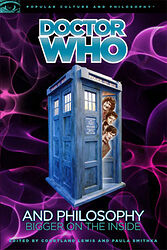
Product prices and availability are accurate as of the date/time indicated and are subject to change. Any price and availability information displayed on Amazon site(s) at the time of purchase will apply to the purchase of this product.
 |
||
|
|
||
|
|

Note: Followed by More Doctor Who and Philosophy. Cover blurb: "This dimensionally transcendental volume explains what the Doctor never gets around to until later: the basics of Gallifreyan philosophy and ethics, as translated through Earth’s philosophers. A fun, informative volume for folks interested in an introduction to philosophy through the vortex of Doctor Who." "Lewis and Smithka have done all sapient species a brilliant service by introducing Doctor Who and Philosophy into the time continuum. Like the Doctor’s human companions, we get to travel through a universe of Big Ideas with a caring, clever, and, yes, conflicted friend. Next to a real TARDIS swooping down and carrying us off, nothing could beat the experience of reading this book." "Doctor Who and Philosophy makes you want to go right back to episodes like ‘Robot’ and ‘The Brain of Morbius’ so you can watch them again, now that you know what they’re really about. No series in the entire history of television has lit up all the beacons of classic philosophy like Doctor Who, and this brilliant book is chock full of Time Lord enlightenment." “An intriguing collection of essays that examines Doctor Who from every philosophical angle imaginable. Do you want theories and contradictions of time travel? It’s in there. Do you want a deep examination of the nature of identity, as understood through the Doctor and his regenerative ability? It’s in there, too, and so is much, much more! All Who fans and armchair philosophers must have this in the library of their TARDIS." COURTLAND LEWIS came to philosophy ultimately through Doctor Who, after his brother tried to explain regeneration to him when the Fourth Doctor became the Fifth Doctor. Court has contributed chapters to Mr. Monk and Philosophy: The Curious Case of the Defective Detective (2010) and Ruminations, Peregrinations, and Regenerations: A Critical Approach to Doctor Who (2010). PAULA SMITHKA had a deprived childhood: as an American growing up without cable, she missed her required shots of Doctor Who, and has been desperately trying to make up for it ever since. Paula is Associate Professor of Philosophy at the University of Southern Mississippi. | |||||||||||||||||||||||||||||||||||||||||||||||||||||||||||||||||||
| Go back | ||